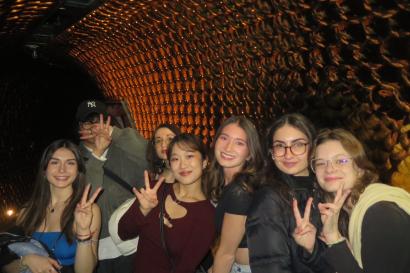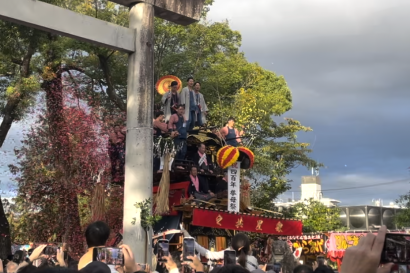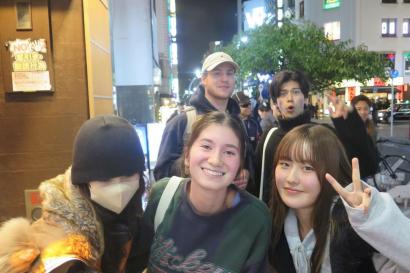Like being a foreigner in any country, experiencing cultural differences can give you culture shocks. I have experienced culture shocks before, having lived in Spain for an academic year in high school. However, since Spanish culture is closer to Western culture like the United States’, it is safe to say that the shocks that I experienced in Japan were more difficult to absorb. Of course, there are small differences from US culture in Japan like not holding doors open for strangers or the bright and cheery “irasshaimasei” every time you enter a store. But some differences are more fundamental to the mindset of Japanese society that I am still working to come to terms with, even a couple of months into my year abroad. The biggest of these fundamental differences is how I notice women are viewed in this society. In almost every subway, there are warning signs for women to be careful of “upskirting” behavior (which is when men take photos of them under their skirts), warning signs to the perpetrators themselves that cameras are watching them, and even small mirrors on the walls lining escalators so that women can see behavior behind them. In every convenience store, there is sexually explicit material of women in the magazine sections that anyone, including children, can access. In libraries, I have seen salarymen shamelessly pouring over these magazines out in the open, fully dressed in their suits with their suitcases by their sides, as if this was their daily after-work activity. Personal experiences during nights out with friends have become particularly shocking, as certain behaviors that I have never experienced in the States happen almost every night out. Even if you have never come to Japan, you might have noticed that in almost every manga and anime there is at least one female character who is dressed very promiscuously, even if it has nothing to do with the plot or has any meaning with the character. These are just a few of many ways I have noticed how women are perceived in Japan, and it is hard for me not to think that women are perceived more commonly as objects here than they are where I am from.
Coming from an area in the United States where I have been socialized to be a staunch feminist and fully understand the power of women since I was a child, these observations have taken me aback, to say the least. I cannot help but think that if this behavior was exhibited in the US, there would be quite loud public opposition. At first, I wanted to give this culture shock the benefit of the doubt and ride out the wave of it, hoping that I would understand that it is not as bad as it looks on the surface. I even spoke with some Japanese dormmates who I share a kitchen with and what their opinions were of these observations that I had made. The response that I got was relieving, as they seemed to understand it was a problem just as I did, however, they would also shrug it off and say that it is what it is. I have to understand that this is the environment that I grew up in, and it is not a shock to them as it is to me, who is experiencing it for the first time. Of course, they have no other society to compare it to if they have never experienced other cultures (which, a majority of them haven’t, with only 23% of the population holding passports in 20191, and 51.8% of singles from the age of 18-29 who have never traveled overseas in 20162). Education on social issues such as these is also a driving force for change, and I quickly learned that no such education is offered in the average Japanese curriculum, public or private. Because of these factors, I do not blame the people (to a certain extent) for the observances that gave me a shock. They are a product of thousands of years of culture and society constantly evolving, with even a majority of this history having been closed to the outside world. Within the past couple of decades, Japanese society has changed drastically and relatively quickly due to globalization. Even writing this blog is in its own way ethnocentric because I am an outsider–not to mention, an American– judging and criticizing this society for the way that it is because it is not similar to mine. I clearly have my ideas about what is wrong and right, but because I am living in their country and with their people, I will be respectful. I can of course maintain my personal morals and believe in my own ethics, but that does not mean that I should take the “moral high ground” because a society that isn’t mine doesn’t match them. Japan is a much, MUCH older country than the United States with such a profound culture full of traditions and a certain mindset that will not change overnight. It is taking its natural course, as it should, as a constantly changing society, just like all others.
Though this may all sound convoluted, it is this understanding that is helping me come to terms with this particular culture shock. I hope that if you are currently in Japan and feeling the same shock, or are a prospective/future study abroad student coming to Japan, this blog may help you hold space for your feelings and emotions as you try to navigate Japanese society, as I am still navigating today.
Sources:
1.) Sahori, Marie. “Japan Has World’s Best Passport, but Few Go Abroad.” Nikkei Asia, 18 Dec. 2019, asia.nikkei.com/Politics/International-relations/Japan-has-world-s-best-passport-but-few-go-abroad.
2.) Nakamura, Testu. “Today’s Young Japanese Have a Different Take on Travel Abroad.” Nippon.com, 28 Sept. 2018, www.nippon.com/en/currents/d00432/.
Emma Suzuki Szwajkowski
Hello, my name is Emma Suzuki Szwajkowski, I'm a fourth-year student at Penn State University studying International Politics and Japanese. During the 2024-2025 academic year, I am studying abroad at Nanzan University in Nagoya, Japan. Join me on my adventure!





